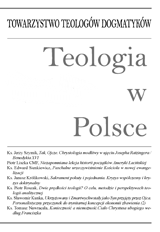Fenomenologia i metafizyka wiary chrześcijańskiej
PHENOMENOLOGY AND METAPHYSICS OF CHRISTIAN FAITH
Author(s): Grzegorz BarthSubject(s): Christian Theology and Religion
Published by: Katolicki Uniwersytet Lubelski Jana Pawła II - Wydział Teologii
Keywords: faith; fides qua; fides quae; person; personalism; M. Scheler
Summary/Abstract: This article presents the personal dimension of faith. In the Old Testament, faith is the secure trust in God’s promise and leadership with relation to the people of Israel. True faith is demonstrated in the form of personal responses (Abraham, Moses, the Prophets). In the New Testament, faith is a concept for the relationship between God and human beings on the basis of God’s saving activity for, in and through Jesus Christ. Faith is the personal, fundamental option in which a human being, through grace and trusting in God’s power, specifically in Jesus Christ, responds in consensus with the Church with his confession of the saving event of revelation. In contrast to its the colloquial meanings (belief as suppose, be of the well-founded conviction, agree with an authority, trust in something based on probability) faith in its personal meaning is an absolute assent based on the inner certainty. The author refers to the phenomenological studies of M. Scheler , who distinguishes between faith (der Glaube, fides qua) and belief (das Glauber, fides quae). Faith is the orientation, attitude on the real existence in the sphere of the absolute – there is burdened with a value sense. In absolute value, which is God, can be answered in the form of faith absolute (full-person). In metaphysical approach faith is shown as comprising the sphere of “seeing” and “hearing” – this integral approach protects it from making insulation to reason, to make it understands.
Journal: Teologia w Polsce
- Issue Year: 8/2014
- Issue No: 1
- Page Range: 53-67
- Page Count: 15

